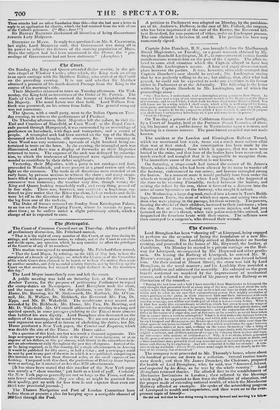erbe SfirtrOy0Ii#.
The Court of Common Council met on Thursday. After a good deal of preliminary discussion, Mr. Pritchard moved,
"That it is the right of every member of this Court, at any time dining its sittings, and without previous notice, to submit, and of the Court to matt Clin and decide upon, any question which he may consider to affect the privileges of the Court or of any of its members."
This motion was agreed to unanimously. Mr. Pritchard then moved,
" That the Lord Mayor, by refusing, on the 12th of Alay last, to hear the complaint of a breach of privilege, tot which the Utah man of the Committee of the whole Coma then claimed to be heard, or to hear the Motion then made by another member, and duly sevonded relative thereto, anti by breaking up the Court on that occasion, has violated the right declared to in the resolution this day."
The Lord Mayor immediately rose and left the court.
A public meeting was held on Saturd
ay last, at time Crown and Anchor Tavern, for the purpose of petitioning Parliament to repeal the stamp-duties on Newspapers. Lord Brougham took the chair, and the room was filled. On the platform, were Mr. Grote, Mr. Ilume, Dr. Bowring. Sir W. Molesworth, Mr. Roebuck, Mr. O'Con- nell, Mr. R. Wallace, Dr. Birkbeek, the Reverend Mr. Fox, Dr. Epps, and Mr. D. Wakefield. The resolutions wane moved and seconded by Dr. Birkbeck, Mr. Hume, Mr. Fox, Dr. Bowling, and Mr. D. Wakefield. Mr. O'Connell addressed the meeting in along and spirited speech, in some passages (relating to the Times) amore abusive than befitted his own dignity. Lord Brougham also descanted on the subject of the meeting, in the usual terms. We are not aware that any new argument was adduced in favour of abolishing the duties, but Mr. Hume produced a New York paper, the Courier and Enquirer, which was double the size of the Times. Mr. flume said- - On a question of this kind, one fact was worth a thousand arguments. This large newspaper was published daily at the price of three-halfpence, or at an expense of ten dollars, or 45s. per annum, with lihetty to the subscribers to in- sert an advertisement daily throughout the year free of expense. Instead of 6s. of 7s. being required, as in this country, for a single advertisement, in America it would be published for fifty cents., or half a dollar and a newspaper could be sent by post to any part of the state in which it was published, comprising in this instance no less than %Ince thousmd miles, at the small expense of one farthing. Compared with this sheet, the produetions of Printing-house Square were as nothing, fur it contained no less than 1371 advertisements.
[It has since been stated that this number of the New York paper was merely a " show number," put forth as a kind of puff. Certainly the NsIv York papers generally are not so large as the Times, and con- tain fewer advertisements : they are also, as might be guessed from their quality, got up with far less trou:le and expense than even our third. rate provincial journals.]
The Thames Navigation and Port of London Committee have before them at present a plan for keeping open a navigable channel of 000feet through the Pool.
A petition to Parliament was adopted on Monday, by the parishion- ers of St. .Andrew's, Holborn, in the case of Mr. Pollock, the surgeon, who has been imprisoned ut the suit of the Rector, the Reverend Gil- bert Beresford, for non-payment of tithes, under an Exchequer process. The sum claimed is between 21. and 81. The petition has been very numerously signed.


























 Previous page
Previous page